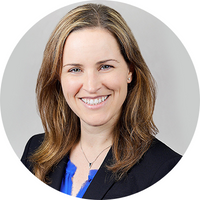
As someone who knows quite a bit about supply chains, what does the average American fail to understand about why the pandemic has made it so difficult to get some products right now?
I think most people have a basic understanding that the items that they buy require manufacturing and delivery, but the knowledge gap is really in the fundamental drivers of these processes. Supply chains are dynamically balanced to optimize the supply for demand while minimizing cost.
Supply chain professionals use tools, models, and measures to maintain that balance. The pandemic brought chaos to the supply chain by removing the ability to leverage historic and forward-looking data to plan. Production, shipping, and imports slowed while consumers stockpiled essential goods, and requested items they did not normally consume.
This resulted in the challenge to keep toilet paper, flour, and yeast on the shelf during the early days of the pandemic. Many companies have adjusted their supply chain to accommodate the new “pandemic normal”. I have also observed companies pivot to supply critical, high consumption items such as hand sanitizer and masks. The good news is that supply chain models now have a data point for pandemic supply and demand behavior, so it should be easier to plan for this type of event in the future.
Congratulations on your Six Sigma Black Belt. What is the profile of the person who should pursue the Black Belt designation? How will it make them better at what they do?
Thank you, it was an excellent opportunity to work with Agilent global teams to make things easier for our customers. Everyone in an organization can benefit from Six Sigma training; developing a continuous improvement mindset benefits everyone, especially customers. For many, the Six Sigma Green Belt certification is the right balance of development and commitment. Learning the methodology and practicing it by running a small project is a great way to drive impactful change.
The Six Sigma Black Belt certification focuses on complex and high value projects. It requires a serious commitment of time and resources. An ideal Black Belt candidate is passionate about translating complex data into high quality, actionable outcomes that meet customer needs.
They should also be highly capable project managers, consensus builders, change leaders, and effective stakeholder managers. Six Sigma Black Belt certification often provides a deep understanding of critical business operations, while developing leadership skills, business acumen, and the ability to lead change while balancing customer, stakeholder, and organizational needs.
In an ACS What Chemists Do Video, you said, “The challenge for anyone with an analytical and data-driven mind is to avoid paralysis by analysis.” What should early-career chemists do to avoid that fate, given that they spent so much time in school acclimating to loads of data?
It is critical to develop the skills to distill data into what is important, impactful, and actionable. Early career chemists can develop data evaluation skills by learning methodologies such as Six Sigma or Lean. Discerning importance and impact can be achieved by understanding what leaders in their organization/institution value. Employee meetings, earnings calls, corporate communications and strategy discussions provide these insights.
Working on cross-functional project teams and developing good working relationships serve as the framework to leverage the data to actionable outcomes. Finding a good mentor streamlines early career navigation and often results from performing well on project teams.
So many people, including yourself, talk about the imperative to make sure they are ‘solving the right problem.’ How does one go about doing that?
My number one piece of advice is to listen before solving the problem. Listening before solving saves time, effort, and cost. It sounds simple, but people forget to listen all the time. Scientists are solvers, so we must be hyper aware of our tendency to provide a solution before hearing the details of the problem.
You are a former chair of the ACS Committee on Economic and Professional Affairs. Do you have any initial thoughts on the domestic employment outlook for chemists and chemical engineers over the next 3 years?
Overall, I think domestic unemployment for chemists and chemical engineers will trend up over the next three years. Historically, the chemistry and chemical engineer unemployment numbers tend to lag the national unemployment numbers, so I would expect a delayed onset of the pandemic unemployment for the chemistry and chemical engineering workforce.
We typically see unemployment increase in manufacturing and industrial employment particularly at the HS/Associates and Bachelors level worker. If unemployment increases are sustained, we see more impact to R&D workers. The 2020 election outcome will also have a significant impact on government employment and research funding availability, so that could further negatively impact or improve unemployment. Finally, the pandemic-related education changes may affect educational employment, which is typically flat. The silver lining to training as a chemist or chemical engineer is that their diverse skills are leverageable in many different job types; frequently we suffer from underemployment rather than unemployment. I think ChemJobber’s preparation advice in April’s C&EN is good practice, even in non-pandemic times.
Many individuals and organizations are committed to increasing the numbers of women and underrepresented minorities in the physical sciences. What does that intervention look like?
We certainly have a lot of work to do in this area. Intervention starts with everyone, at every age, listening, learning, and understanding our implicit and systemic biases. Parents, educators, hiring managers, law makers, and community leaders have a responsibility to understand their biases and how they propagate them through their words and actions.
As a member of the scientific community, it is important to remember that representation matters. Volunteering as a representative of a diverse and inclusive scientific community can show women and underrepresented minorities that they belong. There are many highly qualified people studying this topic; more research and actionable next steps can be found at AAUW and NACME.
You serve as Vice Chair of the Board of Trustees at the Hockessin Montessori School in Delaware. We’re guessing that job got a bit more complicated in March, right?
Absolutely, Hockessin Montessori School has students from 12 mos. to 8th grade so, as you can imagine, we had to navigate a variety of solutions to meet varying developmental and educational needs virtually. Luckily our talented administration and staff stepped up to provide great education, coupled with emotional support for the students despite the challenges the pandemic presented.
In terms of preparing students for careers in industry, what are universities doing really well and where could academia most improve?
I think universities prepare students with a strong fundamental knowledge and a solid framework for students to build upon as they join the workforce. I am encouraged by many schools implementing internships, work study, and research requirements to their programs. There is no substitute for on the job, hands on experience.
There are opportunities for improvement in helping students navigate transitions, career expectations and integrating balance into their approach to work. I love new graduate hires because they are energetic, filled with new ideas and eager to do impactful work, but I often see their expectations of a career clash with the reality of entry level roles. Inviting speakers with diverse backgrounds and jobs to present their career paths to students really helps ground expectations.
What is the one personality trait that has been most instrumental in your career success?
My ability to concisely communicate complex ideas to diverse audiences has been pivotal in my career success. Understanding that the same data set means different things to different audiences allows me to communicate with cross-functional team members more effectively, resulting in faster alignment of our goals, and a more focused drive to deliver our desired outcomes.
San Diego boasts countless ‘sunny and 75 degree’ days, while Delaware has four legitimate seasons. You have lived in both areas. All things being equal, which do you prefer?
I am a huge fan of California weather, but the pace of life on the east coast suits my personality better.
In a 2018 ACS Webinar titled, “Exploring Alternative Careers in Chemistry,” you revealed that your interests include piano, gaming and photography, among other things. Can you share with our audience an image you captured, and why it’s important to you?
This image is a photo of my daughter and husband hiking to the cliffs outside of Vik, Iceland. It is one of my favorite photos because it captures the essence of Iceland: the sea, the cliffs, the volcanic black sand, and puffins dotting the rock faces. It also brings back fond memories of one of my family’s favorite travel adventures. It is especially nostalgic right now, as we long to travel but remain at home to prevent the spread of COVID-19.


Tiffany Hoerter has been a member of the chemistry professional community for 18 years serving in roles at AstraZeneca, DuPont, and Agilent Technologies. Throughout her diverse chemistry career, she has focused her organization, leadership, and consensus building skills to solve complex challenges in the pharmaceutical, electronics, digital printing, and biotechnology sectors. She is an active volunteer leader for the American Chemical Society, currently serving as a Director for the Delaware Local Section and a Member of the Committee on Budget & Finance. She currently serves as the Chemistries Portfolio Manager for Agilent Technologies.
This article has been edited for length and clarity. The opinions expressed in this article are the author's own and do not necessarily reflect the view of their employer or the American Chemical Society.
Copyright 2020 American Chemical Society (All Rights Reserved)









